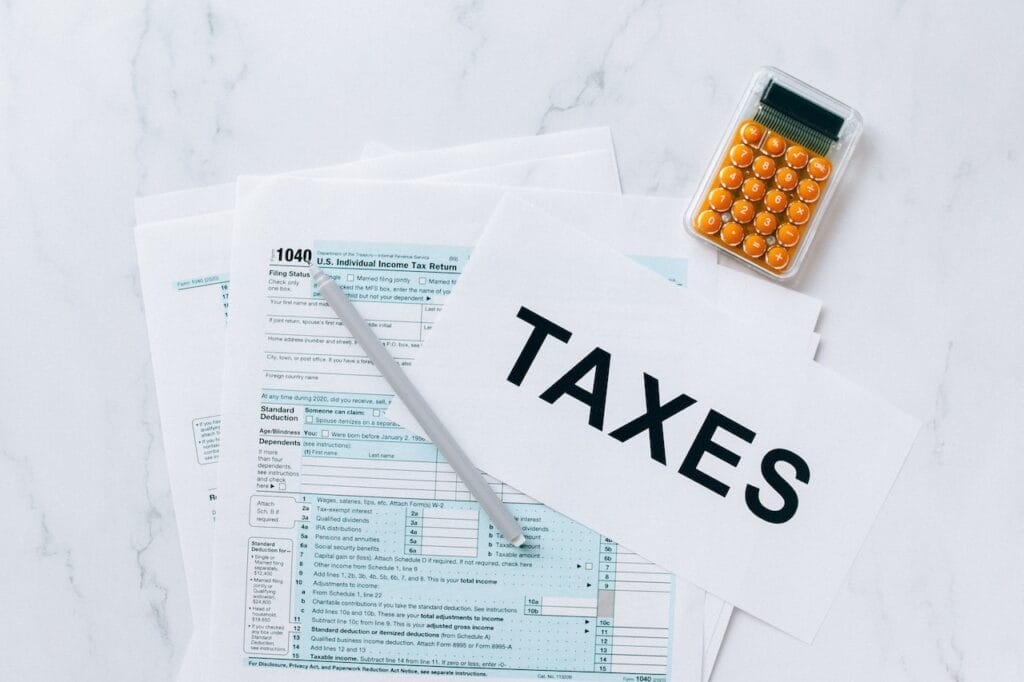Portugal’s capital gains tax is an essential consideration for anyone planning to sell property, investments, or other assets in the country.
Whether you’re a resident, a non-resident, or an investor taking advantage of Portugal’s tax incentives, understanding how capital gains are calculated, taxed, and what exemptions might apply is key to effective financial planning.
In this article, we’ll break down the essentials to help you navigate the rules and make informed decisions.
What is Capital Gains Tax?
Capital gains tax is a tax on the profit you make when you sell an asset for more than its purchase price. In Portugal, this tax applies to property sales made by residents and non-residents. The rules and rates depend on your residency status and how long you have owned the property.
Capital gains tax in Portugal includes specific timelines to determine exemptions or tax benefits. If you sell your primary home and reinvest the proceeds in another property within 24 months, you can qualify for a full exemption. The new property must also serve as your primary residence to meet this condition.
The 36-month rule applies to cases where you plan to buy a new property after selling your current one. You can use this time to purchase another home and claim exemptions on the profits from the sale. This flexibility helps sellers plan their transactions better and reduce tax liabilities.
Portugal capital gains tax allows these timelines to encourage property reinvestment. Keeping clear records of your sale, purchase, and reinvestment is necessary to claim these benefits. Consulting a professional helps avoid errors and ensures compliance with all requirements.
Understanding the rules of capital gains tax in Portugal can save you money when selling property. Proper planning and awareness of these timelines help you reduce tax payments and avoid unnecessary stress. Always check the latest regulations before making property decisions.

Introduction to Capital Gains Tax in Portugal
Capital gains tax in Portugal applies when you sell a property. It impacts both residents and non-residents under different rules. Knowing how the tax works helps you prepare for the costs. Residents are taxed on 50% of the profit from the sale. The tax rate depends on their total income bracket for the year. Proper records of expenses can reduce the amount you pay.
Non-residents face a flat tax rate of 28% on the total gain. This applies to anyone who is not a fiscal resident in Portugal. Accurate proof of residency status avoids complications.
Exemptions are available for certain cases like selling a primary home. Reinvesting the sale amount in another primary residence can save you money. Retirees and long-term residents may qualify for additional benefits.
Costs related to property improvements, renovations, and agent fees can lower the taxable amount. Keeping receipts and proof of payment is very important. Professional advice helps in claiming these correctly.
Portugal capital gains tax can also be reduced under double taxation treaties. These treaties apply to residents of countries with agreements with Portugal. Reviewing the treaty terms avoids paying tax twice on the same gain.
Reporting capital gains is mandatory in the annual tax return. Delays in reporting can lead to penalties and higher payments. Filing on time ensures a smooth process and fewer issues. Understanding Portugal’s tax rules lets you handle property sales more confidently.

How Capital Gains Tax is Calculated
Knowing how Portugal capital gains tax works can make property transactions smoother and more financially manageable. Capital gains tax in Portugal is based on the profit from a property sale. Profit is the selling price minus the purchase price. Eligible deductions, such as renovation and agent costs, can reduce the taxable amount.
For example, if you purchased a property for €200,000 and sold it for €300,000, your profit is €100,000. If you spent €20,000 on renovations and €10,000 on agent fees, these costs reduce the profit to €70,000. This adjusted profit is the amount subject to taxation.
Residents pay tax on only 50% of their adjusted profit, based on their overall income tax rate. If a resident’s taxable income falls into the 28% tax bracket, they would pay 28% of €35,000 (half of €70,000), which equals €9,800. Non-residents pay a flat 28% on the entire €70,000, resulting in a tax payment of €19,600.
You can benefit from exemptions if you meet specific conditions. For instance, selling a primary residence and reinvesting the proceeds in another primary residence within the European Union can exempt you from paying capital gains tax. Retirees and long-term residents may also qualify for reduced rates or exemptions under certain circumstances.
Tax Rates for Residents and Non-Residents in Portugal
From 2019, residents in Portugal pay tax on 50% of the profit from property sales. This taxable amount is added to their annual income and taxed according to their income tax bracket. The rates vary from 14.5% to 48%, depending on the total income for the year.
Non-residents pay a flat rate of 28% on the total profit from property sales. Tax rates in Portugal applies regardless of the seller’s country of residence. Non-residents cannot claim deductions or exemptions available to residents under Portugal capital gains tax rules.
The same rules apply to residents of European Union or European Economic Area countries. If they prove tax residency in their home country, they can benefit from a similar 50% reduction as residents in Portugal. Proper documentation is required to claim this benefit for tax rates in Portugal.
Portugal capital gains tax exemptions have also remained consistent since 2019. Residents who sell their primary home and reinvest the proceeds in another primary residence can claim a full exemption. This reinvestment must occur within 24 months before or 36 months after the sale.

Steps to Obtain Portuguese Residency
The number of foreign residents in Portugal grew by 33.6% in 2023, reaching a total of 1,044,606 individuals holding a residence permit. You can become a Portuguese resident by applying for the right visa or residence permit.
Portugal offers various options for individuals seeking residency based on their circumstances. Each option comes with its own set of requirements and benefits to save capital gains tax in Portugal.
The D7 visa is ideal for retirees or those with passive income. You need to show proof of a stable income from pensions, investments, or remote work. This visa grants residency and allows you to live and travel freely within Portugal.
The Digital Nomad Visa in Portugal allows remote workers to live and work legally. This visa is ideal for individuals who work for foreign employers or operate their own business online. Applicants must provide proof of income that meets the minimum threshold, currently set at four times Portugal’s minimum wage. The visa offers the freedom to stay in Portugal for up to one year, with options to renew or apply for long-term residency.
Labor shortages in 31 occupations show the most in-demand professions and provide valuable insights for aspiring expats applying for a Portuguese Work Visa. So, you should apply for the proper visa.
Our migration and relocation partner, Portugal Residency Advisors®, offers detailed guidance on the visa application process. They provide all the necessary information to meet the requirements for living in Portugal and support expats in making their move.

Capital Gains Tax in Portugal for Rental Income
Portugal offers strong rental yields, making property investment a smart choice. For example, rental yields in Lisbon stand at 5.7%, 6.7% in Porto, and 5% in the Algarve. However, rental income is subject to specific tax rules that investors must understand.
Capital gains tax in Portugal rental income is generally taxed at 25% or 28%, depending on the type of rental agreement. Long-term rental income from 2023 onwards is taxed at 25% under the Mais Habitação law. The tax rate can decrease further depending on the length of the rental contract.
For contracts lasting 2 to 5 years, the tax rate is 25%. Contracts lasting 5 to 10 years are taxed at 15%, while contracts of 10 to 20 years have a 10% rate. Contracts over 20 years enjoy a reduced rate of 5%. These reductions are not available if the monthly rent exceeds the general income limits by more than 50%.
Investors can also benefit from certain deductions when reporting rental income to Portuguese tax authorities. Deductible expenses include compulsory fire insurance for rental properties. Keeping accurate records of all expenses helps reduce taxable income and lowers overall tax liability.

Double Taxation Treaties in Portugal
Portugal has agreements with many countries to prevent double taxation. The real estate regulator in Portugal has treaties to help individuals avoid paying taxes on the same income in Portugal and their home country. This is especially beneficial for residents of countries like the US or UK.
The double taxation treaties apply to various types of income, including rental income and capital gains tax in Portugal. Under these agreements, you may only pay tax in one country or receive a credit in your home country for taxes paid in Portugal. This simplifies tax rates in Portugal and prevents financial burdens.
When dealing with capital gains tax in Portugal, these treaties ensure fair treatment for international taxpayers. For example, if you are a non-resident selling property in Portugal, the treaty may reduce or eliminate your tax liability in your home country. Accurate documentation is essential for claiming these benefits.
Portugal capital gains tax rules, combined with double taxation treaties, make the country an attractive option for property investments. These agreements provide clarity and fairness for international investors. Proper planning ensures compliance and helps you benefit from these treaties effectively.
Portugal Wealth Tax Explained
Portugal applies a wealth tax on properties owned by individuals and companies. The tax is based on the total value of the property and applies annually. Property owners need to understand these rates to plan their finances effectively.
A 0.7 percent tax applies to properties valued between €600,001 and €1 million. For properties valued between €1 million and €2 million, the tax rate increases to 1 percent. Owners of properties valued above €2 million pay a higher rate of 1.5 percent.
Wealth tax rates in Portugal are separate from the capital gains tax in Portugal, which applies when selling property. While the wealth tax is an annual obligation, Portugal capital gains tax is calculated only on the profit made during a property sale. Proper record-keeping is essential for both taxes.

Find Your Dream Property With us
We provide exceptional investment properties in Portugal to suit your needs. Our team helps you find properties with great value and high rental yields. We guide you through the process to make your investment seamless and stress-free.
Portugal offers excellent opportunities for property investors seeking strong returns. Locations like Lisbon, Porto, and the Algarve provide high rental income and property appreciation. We ensure you make informed decisions with professional advice and local expertise.
At Portugal Investment Properties, we help you understand the tax implications of owning property in Portugal. Taxes like capital gains tax in Portugal apply when selling property at a profit. Our experts explain the details to help you plan and manage your investment efficiently.
Frequently Asked Questions
Can I reduce capital gains tax in Portugal?
You can reduce your Capital gains tax in Portugal by reinvesting the proceeds from a property sale into another primary residence. This must be done within the required time frame of 24 months before or 36 months after the sale. Keeping detailed records of expenses and reinvestments is essential.
Is Portugal considered a tax haven?
Portugal is not a tax haven. However, it offers several tax benefits for residents and expats through programs like the Non-Habitual Resident (NHR) scheme. This program provides reduced tax rates and exemptions for foreign income.
How much is the capital gains tax in Portugal?
Residents pay tax on 50% of their capital gains at their income tax rate. Non-residents pay a flat rate of 28% on the total gain. Tax treaties can sometimes reduce the tax burden for non-residents.
Do expats pay no tax in Portugal?
Expats can benefit from tax exemptions under the NHR scheme. However, they still need to pay taxes on property and certain other income generated in Portugal. Consulting a tax advisor is helpful for clarity.
What tax do foreigners pay in Portugal?
Foreigners pay property taxes, rental income tax, and capital gains tax in Portugal. Non-
Are there tax treaties affecting Portugal capital gains tax?
Yes, Portugal has double taxation treaties with many countries. These treaties prevent double taxation on income, rental earnings, and capital gains.
Can property inheritance avoid taxation?
Direct family members do not pay inheritance tax in Portugal. Non-family members may face stamp duty at a fixed rate.
Is rental income taxed differently?
Long-term rental income is taxed at 25%. Short-term rental income may follow different rules based on local regulations.
What other deductions are available for Capital gains tax in Portugal?
You can deduct costs like fire insurance, property repairs, and municipal taxes. These deductions reduce your taxable income.
Does Portugal tax worldwide income?
Residents pay tax on worldwide income. Non-residents are only taxed on income earned within Portugal. Proper residency status ensures correct tax rates.